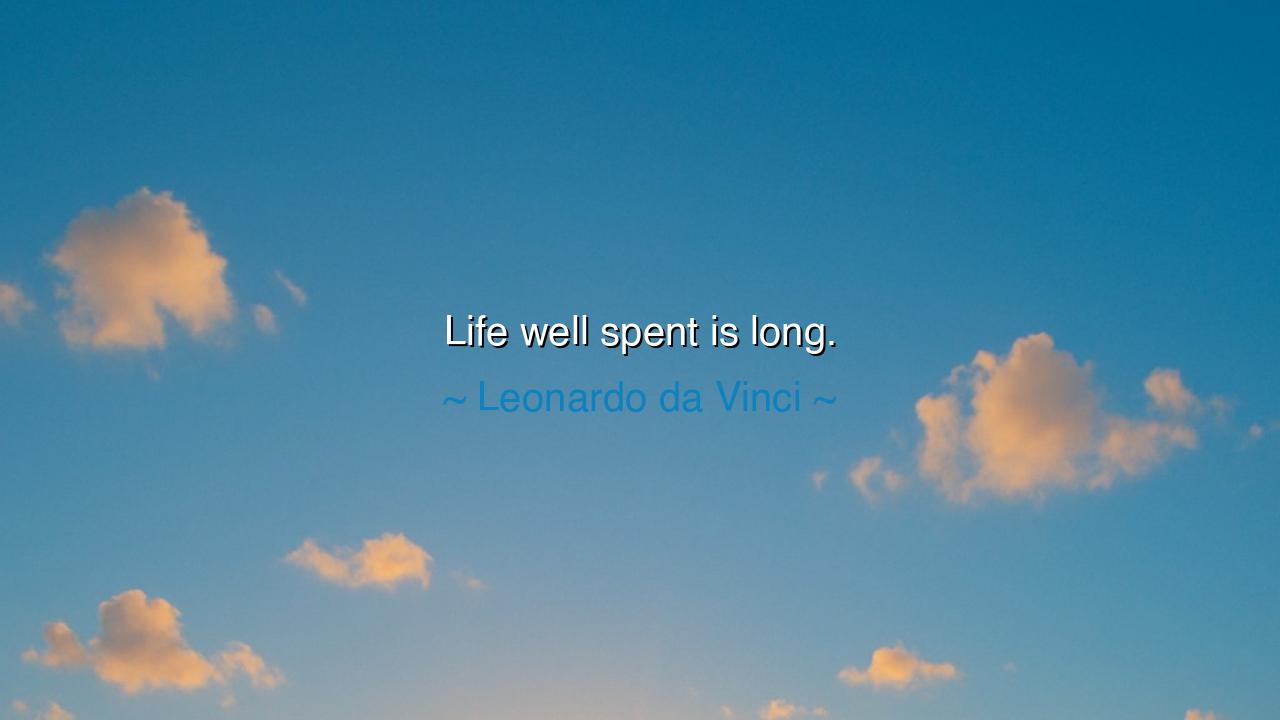
Life well spent is long.






In the vast and endless flow of time, there is one truth that speaks to the very core of our existence: how we spend our lives determines their value. Leonardo da Vinci, the great polymath, once said, "A life well spent is long." At first glance, this statement may seem paradoxical, for we measure the length of a life in years, in moments, in days. Yet, da Vinci teaches us that the true measure of a life is not in its duration, but in how it is spent. A life filled with purpose, meaning, and contribution transcends the limits of time, creating a legacy that endures far beyond the span of mere years.
The ancient wisdom of the Greeks echoes in da Vinci’s words, for Aristotle spoke of eudaimonia, or living a life of flourishing, as the ultimate goal of human existence. To live a life well, according to the ancient thinkers, is to live it with virtue, to seek knowledge, to contribute to the greater good of the world. It is not enough to simply exist, to let the days pass by without purpose. The ancients understood that the true value of a life lies in the intentionality of our actions, in our pursuit of wisdom, and in our devotion to what is meaningful. Da Vinci’s words are a continuation of this timeless truth: a life well lived is one where every moment is dedicated to growth, understanding, and the betterment of the world.
Socrates too, in his unyielding pursuit of wisdom, exemplified this very idea. His life, though short by modern standards, was long in its impact. The philosopher’s commitment to asking deep, meaningful questions and challenging the norms of his time was a life lived with purpose. Socrates did not seek to accumulate wealth or fame, but to understand the deeper truths of existence and to guide others to do the same. His life, though it ended at the hands of those who feared his ideas, continues to echo through the centuries. In his final words, he did not lament his death, but spoke of the truth that his life had been well spent, for in the pursuit of wisdom, he had found meaning.
Similarly, Leonardo da Vinci himself provides a profound example of a life spent in search of knowledge, beauty, and truth. Da Vinci, in his pursuit of art and science, demonstrated a commitment to understanding the world in its fullest expression. His life, though filled with numerous unfinished works and seemingly scattered interests, was united by a single quest: to understand the very fabric of the world around him. From his studies of human anatomy to his brilliant sketches and paintings, da Vinci sought to grasp the mysteries of life and share them with the world. His contributions transcend his years, for his life was imbued with meaning, and that meaning continues to resonate long after his death.
There is another poignant example in the life of Mahatma Gandhi, whose path was also marked by a deep commitment to truth and service. Gandhi’s life, though fraught with struggle and sacrifice, was ultimately one spent in the service of justice, freedom, and non-violence. He did not live for personal gain or worldly recognition, but sought to uplift his people and live in harmony with his principles. His life, though relatively short by the standards of historical leaders, left an indelible mark on the world, showing that a life well spent is not measured by the number of years, but by the depth of its impact.
Da Vinci’s statement teaches us a profound lesson: it is not the length of life that matters, but the way it is lived. To spend a life in pursuit of self-centered desires or material gain is to waste it. The truly long life is the one that touches the hearts of others, that pursues knowledge and wisdom, that contributes to the greater good of humanity. In our modern world, where time often slips away unnoticed, da Vinci’s words urge us to live with intention, to spend each moment cultivating meaning, growing in understanding, and striving toward a higher purpose.
In our own lives, we must reflect on how we spend our time. Are we living with purpose, seeking to contribute to the world in meaningful ways? Are we growing, learning, and deepening our understanding of the truths that govern our lives? Da Vinci’s wisdom invites us to embrace each day as an opportunity to live deliberately, to choose paths that lead to greater wisdom, love, and understanding. For when we do so, we create a legacy that transcends the number of days we have, and in this way, we find that a life well lived is, indeed, long—enduring beyond the limits of time.






AAdministratorAdministrator
Welcome, honored guests. Please leave a comment, we will respond soon